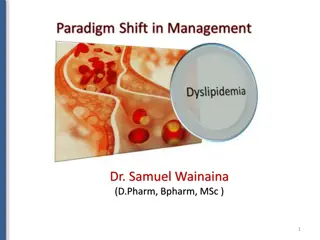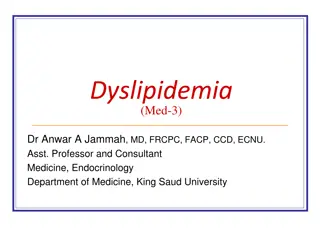Understanding Dyslipidemia and Lipoprotein Disorders
Plasma lipids are transported in complexes called lipoproteins. Dyslipidemia, characterized by elevated cholesterol, triglycerides, or low HDL cholesterol, is a major risk factor for cardiovascular diseases. Learn about lipid metabolism, dyslipidemia management approaches, and the role of pharmacy p
0 views • 32 slides
Optimal Management of Lipids for Secondary Prevention Team Study
Lipid management in secondary prevention plays a crucial role in reducing cardiovascular risk. This study led by Dr. Timir Paul aims to address system-level gaps in care, enhance communication for optimal therapy, and empower patients in achieving target lipid levels. By recognizing disparities and
0 views • 28 slides
Medical Nutrition Therapy in Non-alcoholic Fatty Liver Disease
Medical Nutrition Therapy (MNT) plays a crucial role in managing Non-alcoholic Fatty Liver Disease (NAFLD), focusing on insulin resistance, metabolic syndrome, oxidative stress, dyslipidemia, and cardiovascular risk. Lifestyle recommendations include weight management and increasing physical activit
0 views • 36 slides
Understanding Dyslipidemia and Lipid Transport in Atherosclerosis
Dyslipidemia is characterized by abnormal levels of lipids in the blood, leading to atherosclerosis. Lipid transport mechanisms play a crucial role in the formation and progression of atheromas in artery walls. Chylomicrons carry fats from the intestine to the liver, where they are processed into LD
0 views • 54 slides
Understanding Women's Health: Risks, Prevention, and Care
Women's health encompasses the screening, diagnosis, and management of diseases and conditions affecting physical and emotional well-being. Services are provided by a diverse team of healthcare professionals specializing in obstetrics, gynecology, surgery, and primary care. Cardiovascular disease is
0 views • 46 slides
Microvascular Perfusion Loss in Kidneys of Children with Type 1 Diabetes
Dynamic tissue perfusion measurement using PixelFlux reveals microvascular perfusion loss in the kidneys of children with type 1 diabetes. This study examines the impact of diabetes duration, A1C levels, dyslipidemia, and blood pressure on renal microvessel disease. PixelFlux, a color Doppler ultras
0 views • 23 slides





